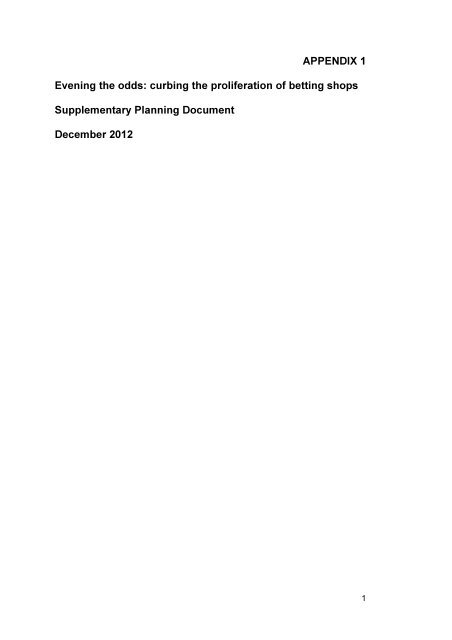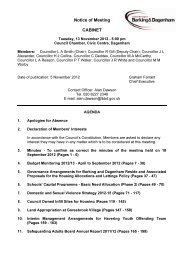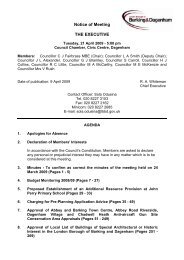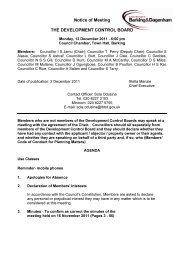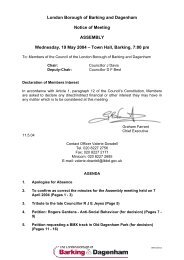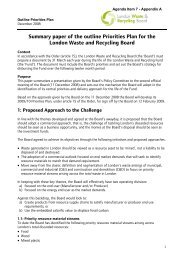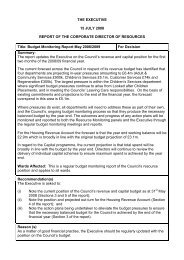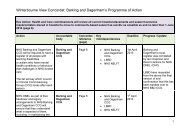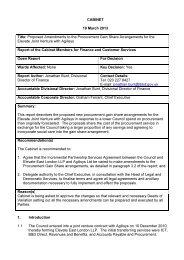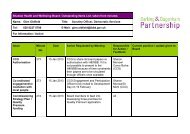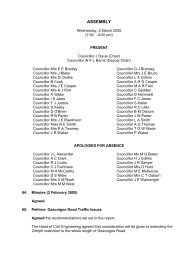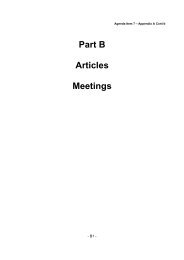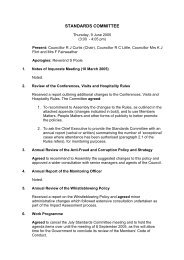Betting Shops Draft Supp Plan Doc - Meetings, agendas, and ...
Betting Shops Draft Supp Plan Doc - Meetings, agendas, and ...
Betting Shops Draft Supp Plan Doc - Meetings, agendas, and ...
You also want an ePaper? Increase the reach of your titles
YUMPU automatically turns print PDFs into web optimized ePapers that Google loves.
APPENDIX 1<br />
Evening the odds: curbing the proliferation of betting shops<br />
<strong>Supp</strong>lementary <strong>Plan</strong>ning <strong>Doc</strong>ument<br />
December 2012<br />
1
Contents<br />
1. Introduction<br />
2. Status<br />
3. <strong>Plan</strong>ning policy framework<br />
4. Consultation<br />
5. Purpose <strong>and</strong> scope<br />
6. The guidance<br />
SPD Implementation Point 1 – Preserving High Street Diversity<br />
SPD Implementation Point 2 – Concentration <strong>and</strong> Clustering<br />
7. Strategic working<br />
8. Monitoring, Implementation <strong>and</strong> Review<br />
9. References<br />
10. Appendix 1: Figure 1 – <strong>Betting</strong> Shop Exclusion Zone<br />
2
1. Introduction<br />
1.1 This <strong>Supp</strong>lementary <strong>Plan</strong>ning <strong>Doc</strong>ument (SPD) explains the Council’s<br />
overall guidance on addressing the social, economic <strong>and</strong> health<br />
impacts of betting shops (Use Class A2) ensuring local communities<br />
have access to thriving high streets with a diverse range of services to<br />
meet their needs. It advises on the appropriate location <strong>and</strong><br />
concentration of such premises.<br />
1.2 In its response to the Mary Portas Review 1 the Government<br />
highlighted Article 4 Directions as a tool to help local authorities <strong>and</strong><br />
communities control certain uses such as betting shops, by removing<br />
permitted development rights, <strong>and</strong> requiring a planning application to<br />
be made. The National <strong>Plan</strong>ning Policy Framework (2012) advises<br />
that the use of Article 4 Directions to remove national permitted<br />
development rights should be limited to situations where this is<br />
necessary to protect local amenity or the wellbeing of the area. This<br />
SPD is intended to be used alongside an Article 4 Direction that will<br />
remove permitted development rights for changes of use to betting<br />
shops.<br />
1.3 Under the current Use Classes Order (1987), which sets out changes<br />
of use that are permitted without planning permission, many high<br />
street uses can be converted into betting shops without a grant of<br />
permission, including restaurants <strong>and</strong> cafes (Class A3), drinking<br />
establishments (Class A4) <strong>and</strong> hot food takeaways (Class A5). The<br />
proposed Article 4 Direction would remove these permitted<br />
development rights <strong>and</strong> would require planning permission to be<br />
sought.<br />
1.4 In September 2012 a consultation, from the Department of<br />
Communities <strong>and</strong> Local Government (DCLG), on changes to the Use<br />
Classes Order closed. The changes proposed in the consultation<br />
paper did not consider betting shops. In response to the consultation<br />
Barking <strong>and</strong> Dagenham Council highlighted its support for the Local<br />
Government Association’s proposal for a local use class. This would<br />
allow local planning authorities (LPAs) to identify specific ‘problem<br />
uses’ <strong>and</strong> require planning permission for such development.<br />
However until the Government acts on this issue an Article 4 Direction<br />
is necessary.<br />
1.5 This SPD specifically supplements the following policies <strong>and</strong><br />
objectives of the Local <strong>Plan</strong>:<br />
Core Strategy (2010)<br />
• SO.2: Reducing Inequalities <strong>and</strong> Promoting Community<br />
Cohesion<br />
• SO.7: Promoting Vibrant Town Centres<br />
3
• SO.13: Improving Health <strong>and</strong> Wellbeing<br />
• CM1: General Principles for Development<br />
• CM5: Town Centre Hierarchy<br />
• CE1: Vibrant <strong>and</strong> Prosperous Town Centres<br />
• CP1: Vibrant Culture <strong>and</strong> Tourism<br />
Borough Wide Development Policies (2011)<br />
• BE1: Protection of Retail Uses<br />
• BE2: Development in Town Centres<br />
• BE3: Retail Outside of Town Centres<br />
• BP8: Protecting Residential Amenity<br />
• BP11: Urban Design<br />
1.6 The SPD does not have the same status as the development plan but<br />
is an important material consideration in the determination of planning<br />
applications.<br />
1.7 The provisions of this SPD will be implemented primarily through the<br />
development management process <strong>and</strong> the determination of<br />
applications for betting shop development. This document is intended<br />
to complement rather than duplicate other planning documents. It<br />
should be read in conjunction with the Barking <strong>and</strong> Dagenham Local<br />
Strategic Partnership’s Community Strategy <strong>and</strong> the adopted Local<br />
<strong>Plan</strong>.<br />
<strong>Betting</strong> shops – a definition<br />
1.8 <strong>Betting</strong> shops are designated in planning terms as use class A2<br />
Financial <strong>and</strong> Professional Services under the Town & Country<br />
<strong>Plan</strong>ning Use Classes Order (1987). <strong>Betting</strong> shops also require a<br />
premises license under the Gambling Act (2005), which is<br />
administered by the Council.<br />
1.9 Under their license terms, the definition of a betting shop is that the<br />
primary activity on the premises must be betting services. Each<br />
premises is permitted to have up to four gaming machines, known as<br />
fixed odds betting terminals. Additional licenses may be required for<br />
the use of other betting mediums to lay bets such as betting websites.<br />
The license is valid for an indefinite period once granted, <strong>and</strong> can only<br />
be repealed if the proprietor breaks the terms <strong>and</strong> conditions of their<br />
license, or fails to pay their annual fee.<br />
4
2. Status<br />
2.1 This guidance has been put together in accordance with the National<br />
<strong>Plan</strong>ning Policy Framework (NPPF, 2012). The statutory Development<br />
<strong>Plan</strong> is the starting point when determining a planning application for<br />
the development or use of l<strong>and</strong>. The Development <strong>Plan</strong> consists of the<br />
London <strong>Plan</strong> (2011) <strong>and</strong> the development plan documents within the<br />
London Borough of Barking <strong>and</strong> Dagenham’s Local <strong>Plan</strong>.<br />
2.2 This SPD provides further detail on the implementation of Local <strong>Plan</strong><br />
policy that applicants must follow to ensure they meet the policy<br />
requirements.<br />
3. <strong>Plan</strong>ning policy framework<br />
3.1 This <strong>Supp</strong>lementary <strong>Plan</strong>ning <strong>Doc</strong>ument (SPD) has been prepared by<br />
the London Borough of Barking <strong>and</strong> Dagenham to address the social,<br />
economic <strong>and</strong> health impacts of betting shops on places <strong>and</strong> people.<br />
The guidance seeks to encourage a diversity of high street uses <strong>and</strong><br />
facilitate safe <strong>and</strong> thriving town centres. It draws upon national <strong>and</strong><br />
regional planning policy guidance <strong>and</strong> exp<strong>and</strong>s on local policies in the<br />
Local <strong>Plan</strong>.<br />
3.2 There are 50 betting shops in Barking <strong>and</strong> Dagenham, which<br />
represents the sixth highest concentration of betting shops in London<br />
per capita. The Council considers that in the interests of the social <strong>and</strong><br />
economic welfare, <strong>and</strong> health, of the borough’s residents <strong>and</strong> the<br />
vitality <strong>and</strong> viability of its town centres that, this proliferation needs to<br />
be carefully controlled. It is for this reason that the Council has<br />
decided to provide further guidance on the location <strong>and</strong> concentration<br />
of betting shops.<br />
3.3 The National <strong>Plan</strong>ning Policy Framework (NPPF) recognises the role<br />
planning takes in addressing social deprivation, supporting the vitality<br />
of town centres <strong>and</strong> promoting healthy communities. Paragraph 23<br />
states that LPAs should recognise town centres as the heart of their<br />
communities <strong>and</strong> pursue policies to support their viability <strong>and</strong> vitality.<br />
LPAs should set out policies that make clear which uses will be<br />
permitted in such locations, <strong>and</strong> promote competitive town centres<br />
that provide a diverse retail offer which reflects the individuality of a<br />
town centre 2 .<br />
3.4 <strong>Supp</strong>orting social <strong>and</strong> economic welfare is at the heart of the town<br />
planning system. Facilitating the creation of sustainable, thriving<br />
communities is fundamental to the spatial planning approach. The<br />
NPPF, published in April 2012, recognises for the first time the role of<br />
planning policies <strong>and</strong> decisions in promoting healthy <strong>and</strong> inclusive<br />
communities 3 , as set out under Core Principle 8: Promoting healthy<br />
communities. The use of Article 4 directions, to remove permitted<br />
development rights is given, in paragraph 200 of the NPPF, as a tool<br />
5
which Local <strong>Plan</strong>ning Authorities should consider using in situations<br />
where it is necessary to protect local amenity or the wellbeing of the<br />
area.<br />
3.5 This follows a wider Government recognition of the importance of<br />
lifestyle-driven health problems. The White Paper Healthy Lives,<br />
Healthy People (2010) 4 recognises that people’s lifestyles play an<br />
important role in health <strong>and</strong> health improvement. Many premature<br />
deaths <strong>and</strong> illnesses could be avoided by improving lifestyles 5 . The<br />
White Paper also recognises that improvements to the environment in<br />
which people live can make healthy lifestyles easier. It further states<br />
that lower socioeconomic groups <strong>and</strong> those living in the more<br />
deprived areas experience the greatest environmental burdens 6 .<br />
3.6 The NPPF seeks to empower local planning authorities to create<br />
thriving <strong>and</strong> safe high streets which provide local communities with a<br />
diverse offer of retail <strong>and</strong> services. Core Principle 2: Ensuring the<br />
vitality of town centres, of the NPPF states that planning should not<br />
simply be about scrutiny, but instead be a creative exercise in finding<br />
ways to enhance <strong>and</strong> improve the places in which people live their<br />
lives 7 . Paragraph 69 of the NPPF requires planning policies <strong>and</strong><br />
decisions to create safe <strong>and</strong> accessible environments where crime<br />
<strong>and</strong> disorder, <strong>and</strong> the fear of crime, do not undermine quality of life or<br />
community cohesion 8 . The proliferation <strong>and</strong> clustering of betting shops<br />
has the potential to undermine not only the quality of life for local<br />
residents but to degrade the vitality <strong>and</strong> diversity of the borough’s high<br />
streets. Paragraph 161 of the NPPF states that LPAs should use upto-date<br />
<strong>and</strong> relevant evidence to assess locations of deprivation which<br />
may benefit from remedial action 9 . Furthermore, paragraph 157<br />
requires local plans to identify areas where it may be necessary to<br />
limit freedom to change the uses of buildings, <strong>and</strong> support such<br />
restrictions with clear explanation 10 . National guidance also requires<br />
planning policies <strong>and</strong> decisions to guard against the unnecessary loss<br />
of valued facilities <strong>and</strong> services, particularly where this would reduce<br />
the community’s ability to meet its day-to-day needs, as set out in<br />
Paragraph 70 of the NPPF 11 .<br />
3.7 Regional guidance under the Greater London Authorities (GLA) Best<br />
Practice Guidance – Health Issues in <strong>Plan</strong>ning (2007) emphasises the<br />
link between planning <strong>and</strong> health outcomes 12 . The guidance highlights<br />
the importance of putting physical, mental <strong>and</strong> community health<br />
objectives at the centre of plan making <strong>and</strong> planning decisions.<br />
3.8 A key economic policy objective of the London <strong>Plan</strong> (2011) is to<br />
address areas of deprivation across the city 13 . Policy 3.1: Ensuring<br />
Equal Life Chances for All states the need to address the barriers to<br />
meeting the needs of particular groups <strong>and</strong> communities. Policy 3.1<br />
requires development proposals to protect <strong>and</strong> enhance facilities <strong>and</strong><br />
services that meet the needs of particular groups <strong>and</strong> communities.<br />
Further to this, Policy 3.2: Improving Health <strong>and</strong> Addressing Health<br />
6
Inequalities sets out the Mayors determination to create healthy<br />
places for all – from homes to neighbourhoods. This should be<br />
achieved through a range a measures including ‘promoting a strong<br />
<strong>and</strong> diverse economy providing opportunities for all.’<br />
3.9 The London <strong>Plan</strong> also seeks to ensure that local planning policies <strong>and</strong><br />
decisions maintain <strong>and</strong> enhance the vitality of high streets <strong>and</strong><br />
diversity of services for local communities. Policy 4.7: Retail <strong>and</strong> Town<br />
Centre Development, states that LPAs should take a strong,<br />
partnership approach to assessing town centre needs, <strong>and</strong> that Local<br />
<strong>Plan</strong>s should include mechanisms to undertake regular town centre<br />
health checks to inform strategic <strong>and</strong> local policy <strong>and</strong> implementation.<br />
3.10 Policy 7.1: Building London’s Neighbourhoods <strong>and</strong> Communities, of<br />
the London <strong>Plan</strong>, seeks to ensure that communities have access to a<br />
good quality environment. The policy states that development should:<br />
• Enable people to live healthy, active lives<br />
• Maximise the opportunity for community diversity, inclusion <strong>and</strong><br />
cohesion<br />
• Contribute to people’s sense of place, safety <strong>and</strong> security<br />
• Meet the needs of the community at all stages of people’s lives<br />
3.11 A study by the GLA into London’s high streets in July 2012 14 found<br />
that in recent years there has been an increase in particular services<br />
on London’s high streets, including betting shops, payday loan stores,<br />
pawnbrokers <strong>and</strong> fast food takeaways. This has led to concerns about<br />
a lack of diversity on the high street. London <strong>Plan</strong> Policy 4.8:<br />
<strong>Supp</strong>orting a Successful <strong>and</strong> Diverse Retail Sector states that<br />
boroughs should support a successful, competitive <strong>and</strong> diverse retail<br />
sector which promotes sustainable access to the goods <strong>and</strong> services<br />
that Londoners need. Local <strong>Plan</strong>s should support convenience retail<br />
<strong>and</strong> develop policies to prevent the loss of retail <strong>and</strong> related facilities<br />
that provide essential convenience <strong>and</strong> specialist shopping.<br />
3.12 This SPD seeks to complement existing policies contained within the<br />
adopted Local <strong>Plan</strong>. Policy BE1: Protection of Retail Uses, of the<br />
Borough Wide Development Policies DPD seeks to protect retail uses.<br />
Under current permitted development rights contained within the Town<br />
<strong>and</strong> Country <strong>Plan</strong>ning Use Classes Order (1987), a wide range of high<br />
street uses can be converted into betting shops without the need for<br />
planning permission.<br />
Uses which do not require planning permission to become betting<br />
shops include:<br />
• A2 uses (Financial <strong>and</strong> Professional Services)<br />
• A3 uses (Food <strong>and</strong> Drink)<br />
• A4 uses (Drinking Establishments)<br />
• A5 uses (Hot Food Takeaways)<br />
7
Due to this wide scope for betting shop development, the Council<br />
considers that separate policy guidance is required to control their<br />
proliferation <strong>and</strong> clustering.<br />
3.13 Policy BE2: Development in Town Centres, of the Borough Wide<br />
Development Policies DPD promotes development in town centres<br />
that will bring vitality, viability <strong>and</strong> regeneration benefits. All<br />
development in town centres is required to meet a series of design<br />
criteria including ‘not to be detrimental to the visual <strong>and</strong>/or<br />
environmental character <strong>and</strong> amenity of the area’ this includes<br />
reference to general disturbance.<br />
3.14 The Local <strong>Plan</strong> also considers the health impacts of development.<br />
Policy BC10 sets out the Council’s commitment to working with NHS<br />
Barking <strong>and</strong> Dagenham to improve the health of the local population<br />
<strong>and</strong> reduce health inequalities. This builds on Strategic Objective 13<br />
which seeks to improve the health <strong>and</strong> well being of residents <strong>and</strong><br />
reducing health inequalities.<br />
3.15 The Localism Act (2011) 15 enshrined the Government’s commitment<br />
to devolve planning powers to the lowest possible level. The borough<br />
of Barking <strong>and</strong> Dagenham has the sixth highest number of betting<br />
shops in London per capita, with 50 premises currently licensed. In<br />
seeking to address a local planning issue, this SPD therefore seeks to<br />
help to deliver the Government’s localism agenda.<br />
3.16 This SPD is part of a broader strategy to tackle social, economic <strong>and</strong><br />
health issues in Barking <strong>and</strong> Dagenham. Improving the economic<br />
prosperity, social wellbeing <strong>and</strong> health of the borough’s residents is a<br />
cross cutting policy incorporated within a number of objectives in the<br />
adopted Local <strong>Plan</strong>. This SPD seeks to reduce the proliferation of<br />
betting shops across the borough, <strong>and</strong> will be used to inform local<br />
master-planning <strong>and</strong> regeneration strategies. This SPD aims to<br />
improve the economic prosperity, social wellbeing <strong>and</strong> health of the<br />
borough’s population <strong>and</strong> safeguard <strong>and</strong> enhance the vitality of the<br />
borough’s town centres by reducing the prevalence <strong>and</strong> clustering of<br />
betting shops.<br />
8
4. Consultation<br />
4.1 The consultation on this <strong>Draft</strong> SPD is in line with Barking <strong>and</strong><br />
Dagenham’s Statement of Community Involvement <strong>and</strong> runs from<br />
XX January 2012 to XX February 2013.<br />
Copies are available on the Barking <strong>and</strong> Dagenham website at<br />
http://barking-dagenham.limehouse.co.uk/portal/<br />
Alternatively, you can request a copy by emailing<br />
planningpolicy@lbbd.gov.uk or writing to:<br />
Dal Farah<br />
Regeneration <strong>and</strong> Economic Development<br />
London Borough of Barking <strong>and</strong> Dagenham<br />
Room 104<br />
Town Hall<br />
1 Town Square<br />
Barking<br />
IG11 7LU<br />
Responses can be made online at<br />
http://barking-dagenham.limehouse.co.uk/portal/, sent by email to<br />
planningpolicy@lbbd.gov.uk or by post to the above address<br />
9
5. Purpose <strong>and</strong> scope<br />
Evening the Odds: Examining the impact of betting shops in<br />
Barking <strong>and</strong> Dagenham<br />
5.1 The proliferation of betting shops in town centres has become<br />
increasingly recognised as a challenge for local councils across the<br />
UK. There are 8,400 betting shops in the UK 16 <strong>and</strong> the Government<br />
estimates that there are approximately 250,000 problem gamblers 17 .<br />
Problem gambling is seen as a health disorder <strong>and</strong> has been<br />
identified as ‘gambling that compromises, disrupts or damages family,<br />
employment, personal or recreational pursuits’ 18 . Groups at risk of<br />
becoming problem gamblers include minority ethnic groups, those<br />
from lower socio-economic groups, those with existing mental health<br />
or substance misuse problems <strong>and</strong> adolescents 19 .<br />
5.2 Research by the Gambling Commission concurs with this local NHS<br />
evidence 20 . A 2010 report found higher than average rates of problem<br />
gambling amongst young adults, minority ethnic groups, the<br />
unemployed, those with severe financial difficulties <strong>and</strong> those who<br />
drank the highest amount of alcohol 21 . This evidence is particularly<br />
pertinent given Barking <strong>and</strong> Dagenham’s socio-economic <strong>and</strong><br />
demographic profile. Can it be considered a coincidence that Barking<br />
<strong>and</strong> Dagenham, which has a disproportionately high proportion of<br />
these groups, also has a disproportionately high number of betting<br />
shops?<br />
5.3 Gambling addiction has been linked to a range of health <strong>and</strong> social<br />
problems including alcoholism, substance abuse <strong>and</strong> crime. Rates of<br />
depression <strong>and</strong> attempted suicide among problem gamblers are<br />
around twice the national average 22 , <strong>and</strong> problem gambling has been<br />
linked to mental health issues such as anti-social personality disorders<br />
<strong>and</strong> phobias 23 . There is also a link between domestic violence <strong>and</strong><br />
gambling – a finding which is significant given that Barking <strong>and</strong><br />
Dagenham has the highest reported domestic violence incidence rate<br />
in London 24 .<br />
5.4 There is evidence to suggest that the growth of betting shops is<br />
particularly prominent in areas with high levels of social <strong>and</strong> economic<br />
deprivation 25 . This is significant, as the level of problem gambling<br />
within a community is known to be linked to the available opportunities<br />
to gamble 26 . Barking <strong>and</strong> Dagenham has one of London’s highest<br />
concentrations of betting shops per capita. Other east London<br />
boroughs with notable concentrations of betting shops include<br />
Newham, Haringey <strong>and</strong> Hackney. A commonality with Barking <strong>and</strong><br />
Dagenham is that these local authorities rank amongst London’s most<br />
deprived boroughs 1 . Barking <strong>and</strong> Dagenham has the lowest gross<br />
1 Barking <strong>and</strong> Dagenham is the seventh most deprived of London’s 33 boroughs <strong>and</strong> 22 nd<br />
most deprived of Engl<strong>and</strong>’s 354 local authorities. More than one in ten of the Borough’s<br />
residents live in wards which fall within the 10% most deprived in Engl<strong>and</strong>. Unemployment in<br />
Barking <strong>and</strong> Dagenham is 12.4%; this is 25% higher than the London average <strong>and</strong> 35%<br />
10
weekly earnings across all London boroughs. <strong>Betting</strong> shops rely on<br />
customers losing money. It may therefore seem irrational for Barking<br />
<strong>and</strong> Dagenham to have one of the highest concentrations of betting<br />
shops in London. Perhaps then is could be expected that betting<br />
shops would be more prevalent in those boroughs with the highest<br />
disposable incomes. Evidence however indicates that this is not the<br />
case 27 . Analysis by Geofutures reveals that betting shops cluster in<br />
those town centres across Great Britain where residents are on the<br />
lowest incomes <strong>and</strong> in areas where those who can least afford to<br />
spend money on an activity which is loss making 28 .<br />
5.5 What explanation can there be for this? It should be recognised that<br />
betting is a popular pastime of the working class. A traditional pastime<br />
which, for those who know the risks involved, gambling is regarded as<br />
an affordable <strong>and</strong> entertaining leisure activity. The clustering of<br />
bookmakers in areas of greatest deprivation could therefore be seen<br />
as the market responding to this recognised customer base. Yet, such<br />
areas are also those locations where the most susceptible to harm<br />
from gambling reside 29 . People on the lowest incomes are more<br />
vulnerable to gambling, whether this is due to their financial<br />
predicament, their health or their knowledge of the risks <strong>and</strong> dangers<br />
involved 30 .<br />
5.6 The Gambling Act 2005 limits the number of Fixed Odds <strong>Betting</strong><br />
Terminals (B2 gaming machines or FOBT) per shop. This is currently<br />
set at four per premises. Bookmakers derive over 40% of their profits<br />
from these machines <strong>and</strong> less from traditional gambling, like<br />
horseracing 31 . A means around the FOBT limit is to open another<br />
<strong>Betting</strong> Shop. This has led to the clustering of betting shops, this may<br />
explain why in Barking Town Centre there are premises of the same<br />
chain in close proximity. Again, it could be argued that bookmakers<br />
are simply satisfying customer dem<strong>and</strong>. Whilst this is true, when that<br />
dem<strong>and</strong> may be due to an addiction it is a pattern that cannot be<br />
ignored. Clustering also increases the likelihood of anti-social<br />
behaviour <strong>and</strong> impacts on the diversity of the high street which in turn<br />
is to the detriment of vitality <strong>and</strong> viability 32 . Nowhere is this better<br />
illustrated in Barking <strong>and</strong> Dagenham than on Station Parade, an<br />
important gateway into the borough <strong>and</strong> for those arriving from<br />
Barking Station the first impression of Barking Town Centre. The close<br />
proximity of three betting shops on Station Parade creates an<br />
intimidating environment which detracts from the ambiance of the high<br />
street <strong>and</strong> is not providing a fitting arrival for what is a Major Centre.<br />
5.7 While Barking <strong>and</strong> Dagenham is not deprived because it has a high<br />
prevalence of betting shops, they are a visible symptom of<br />
deprivation. <strong>Betting</strong> shops do not contribute to the Council’s number<br />
one priority which is raising household incomes, clearly they do the<br />
higher than the UK average. The proportion of those reliant on welfare support is also high,<br />
with 6% of borough residents on out-of-work benefits; 32% higher than the London average<br />
<strong>and</strong> 37% higher than the UK average.<br />
11
opposite 2 . On this basis doing nothing is not an option. The Council<br />
has a duty to use its planning powers to control the proliferation of<br />
betting shops.<br />
5.8 The concentration <strong>and</strong> clustering of betting shops in the borough’s<br />
parades also has a detrimental effect on the diversity <strong>and</strong> therefore<br />
the health of the high street. This proliferation is evidenced in<br />
consecutive retail studies that have been conducted in the borough in<br />
2006, 2009 <strong>and</strong> 2012. Each study has found an over representation of<br />
betting shops. This disproportionate representation of betting shops, if<br />
left unchecked, will impact on the mix of retailers on our high streets.<br />
For such centres <strong>and</strong> parades to be successful it is imperative that<br />
there are a range of retailers proving a breadth of products to<br />
encourage a diverse customer base, increased footfall <strong>and</strong> to sustain<br />
the life of the borough’s high street.<br />
How planning can control the proliferation of betting shops in<br />
Barking <strong>and</strong> Dagenham.<br />
5.9 In July 2012 the London Assembly’s Economy Committee launched<br />
an investigation into empty shops on London’s high streets 33 . The<br />
briefing highlighted the issue of the clustering of betting shops <strong>and</strong> the<br />
Mayor’s pledge to lobby the Government to give local Council’s<br />
greater control over their proliferation. In 2009 the London Borough of<br />
Lewisham sought powers to set a cap on the number of betting shops<br />
in the borough <strong>and</strong> to require planning permission for new premises.<br />
Lewisham Council were attempting to use powers under the<br />
Sustainable Communities Act (2007) but the proposal was not taken<br />
forward by the DCLG. Several other London boroughs, including<br />
Hackney <strong>and</strong> Haringey, have raised the issue of the proliferation of<br />
betting shops <strong>and</strong> Council Members have sought greater local<br />
planning powers to control <strong>and</strong> reduce their concentration.<br />
5.10 Members of Parliament have also put forward a private members Bill.<br />
The <strong>Betting</strong> <strong>Shops</strong> Bill (2010-2012) proposed an amendment to the<br />
Town <strong>and</strong> Country <strong>Plan</strong>ning (Use Classes) Order to create a separate<br />
use class for betting shops. It also sought the ability to allow LPAs to<br />
assess dem<strong>and</strong> for betting shops <strong>and</strong> place a cap on the number of<br />
these premises for which planning permission may be granted in any<br />
area 34 . However, the Bill failed to complete its passage through<br />
Parliament.<br />
5.11 The Portas Review (2011) into the future of the UK’s high streets<br />
included a recommendation to put betting shops into a separate use<br />
2 Data from national charity the Consumer Credit Counselling Service (CCCS) indicates that<br />
residents in Barking <strong>and</strong> Dagenham have the third highest monthly debt problems of all<br />
London boroughs. Debtors from the borough have an average monthly household deficit of<br />
£80 <strong>and</strong> an average unsecured debt of over £16,000. Barking <strong>and</strong> Dagenham also has the<br />
highest proportion of debtors in mortgage arrears <strong>and</strong> the highest rate of repossession in<br />
Engl<strong>and</strong>.<br />
12
class category 35 . Following the Portas Review, the Government<br />
published High Streets at the Heart of our Communities: the<br />
Government’s Response to the Mary Portas Review 36 . In this<br />
document the use of an Article 4 Direction was highlighted as the<br />
appropriate tool for controlling certain uses such as betting shops, by<br />
removing their permitted development rights, <strong>and</strong> requiring a planning<br />
application to be made.<br />
5.12 The London Borough of Barking <strong>and</strong> Dagenham has produced this<br />
SPD <strong>and</strong> its corresponding Article 4 Direction in response to the<br />
Government’s assertion that this is the correct means of controlling<br />
betting shops.<br />
13
6. The guidance<br />
SPD Implementation Point 1 – Preserving High Street Diversity<br />
<strong>Plan</strong>ning permission for new betting shops will not be granted in<br />
the betting shop exclusion zone. This is where proposals:<br />
• Fall within 400m of the boundary of an existing permitted<br />
betting shop<br />
The betting shop exclusion zone is detailed in Figure 1.<br />
REASONED JUSTIFICATION<br />
6.1 The London Borough of Barking <strong>and</strong> Dagenham has the sixth highest<br />
concentration of betting shops in London per capita. There are<br />
currently 50 licensed premises across the borough <strong>and</strong> notable<br />
concentrations within Barking Town Centre, Dagenham Heathway,<br />
Chadwell Heath <strong>and</strong> the shopping parades of the Becontree Estate.<br />
6.2 Research indicates that betting shops are part of a wider degradation<br />
of high street diversity <strong>and</strong> vitality since the onset of the recession 37 .<br />
Successive high street surveys of the borough have found an over<br />
representation of particular services, with betting shops consistently<br />
over represented. Local retail health checks, which look at the<br />
composition of high street services, have consistently identified the<br />
issue of the over <strong>and</strong> under representation of particular premises<br />
across Barking <strong>and</strong> Dagenham in the past few years 38 . The<br />
overrepresentation of particular services such as betting shops is not<br />
desirable in terms of trying to sustain the viability <strong>and</strong> viability of the<br />
borough’s centres. The borough retail study also confirmed that the<br />
over representation of betting shops, <strong>and</strong> other services such as hot<br />
food take aways, is especially strong amongst centres in the most<br />
deprived parts of the borough 39 .<br />
6.3 The Council considers that limiting the proliferation of betting shops<br />
within the borough is an important component of Barking <strong>and</strong><br />
Dagenham’s strategic health <strong>and</strong> regeneration initiatives. A betting<br />
shop exclusion zone is particularly important considering the<br />
borough’s high proportion of groups deemed to be vulnerable to<br />
problem gambling – minority ethnic groups <strong>and</strong> those from lower socio<br />
economic groups. The exclusion zone is set at 400m, this is<br />
considered to be a sufficient distance to prevent clustering <strong>and</strong><br />
proliferation within the borough’s town centres. The Urban Design<br />
Compendium (2000) 40 , a recognised <strong>and</strong> well referenced guide,<br />
advises that ‘a widely used benchmark is for mixed development<br />
neighbourhoods to cover a 400m radius, equating to about five<br />
minutes walk’.<br />
14
SPD Implementation Point 2 – Concentration <strong>and</strong><br />
Clustering<br />
<strong>Plan</strong>ning permission will only be granted for a betting shop<br />
outside of the betting shop exclusion zone provided that:<br />
• It is within Barking Town Centre, or Dagenham Heathway,<br />
Chadwell Heath <strong>and</strong> Green Lane District Centres or one of<br />
the Neighbourhood Centres.<br />
• It will lead to no more than 5% of the units within the<br />
centre or frontage being betting shops.<br />
Basis for Calculation<br />
The percentage is based on the measured frontage in relation to<br />
both:<br />
• The proportion of non-A1 uses in each identified primary<br />
or secondary frontage.<br />
• The proportion of non-A1 uses across the entire primary<br />
frontages, secondary frontages or neighbourhood<br />
frontages in question.<br />
For Neighbourhood Centres, the percentage calculation is solely<br />
based on the proportion of non-A1 uses in the entire shopping<br />
area.<br />
The location <strong>and</strong> boundaries of the District <strong>and</strong> Neighbourhood<br />
Centres are detailed in Figure 1.<br />
REASONED JUSTIFICATION<br />
6.4 In accordance with Borough Wide Development <strong>Plan</strong>ning Policy BE3,<br />
new retail development is expected to be located in the town centres<br />
set out in Core Strategy Policy CM5.<br />
6.5 Borough Wide Development Policy BE3 makes it clear that planning<br />
permission for retail development outside or on the edge of a town<br />
centre will only be granted where it can be demonstrated that it<br />
benefits the existing community <strong>and</strong> fits in with planning objectives.<br />
Therefore, betting shops will not be permitted outside the borough’s<br />
town centres. Within the borough’s town centres betting shops will be<br />
allowed outside the exclusion zone provided they satisfy the criteria<br />
set out in this SPD.<br />
15
6.6 The prevalence of betting shops displaces other high street uses <strong>and</strong><br />
impacts on the vitality of designated town <strong>and</strong> neighbourhood centres.<br />
The clustering of betting shops, such as in Barking Town Centre,<br />
creates an intimidating environment <strong>and</strong> detracts from the high street<br />
ambiance the Council is trying to achieve.<br />
6.7 As discussed in Section 5 of this SPD, the level of problem gambling<br />
within a community is known to be linked to available opportunities to<br />
gamble 41 . The over representation of betting shops in deprived wards<br />
not only restricts the retail choices available to local communities, but<br />
can also have a damaging effect on their health <strong>and</strong> finances. With a<br />
high number of the borough’s residents in financial difficulty, high<br />
levels of unemployment <strong>and</strong> personal debt, the ability to quickly spend<br />
large sums of money in betting shops could be considered to be a<br />
contributory factor in maintaining a detrimental behavioural spiral<br />
towards ill health <strong>and</strong> other social problems.<br />
6.8 Consequently, to ensure that shopping areas are diverse <strong>and</strong><br />
balanced, especially in designated centres, applications for betting<br />
shops will be assessed for their cumulative impact.<br />
7. Strategic working<br />
7.1 In t<strong>and</strong>em with this guidance the Council <strong>and</strong> its partners are<br />
implementing a number of initiatives to help improve the economic<br />
<strong>and</strong> social prosperity, <strong>and</strong> health, of the borough’s residents.<br />
Council Property <strong>and</strong> Regeneration<br />
7.2 The Council is a major property owner <strong>and</strong> this includes a significant<br />
number of shop units. Notwithst<strong>and</strong>ing that many of these units are let<br />
on long leases, where opportunities arise, the Council will work with<br />
l<strong>and</strong>lords to reduce the number of betting shops in its properties.<br />
Where the Council is a partner in new developments it will look to limit<br />
the opportunities for new betting shops, for example through the use<br />
of conditions or covenants as appropriate.<br />
Council’s Licensing Authority<br />
7.3 Whilst this guidance will help restrict opportunities for new betting<br />
shops to establish themselves in the borough the reality is that many<br />
of Barking <strong>and</strong> Dagenham’s centres already have notable<br />
concentrations of betting shops. Therefore, the Council <strong>and</strong> the<br />
Trading St<strong>and</strong>ards <strong>and</strong> Licensing team will look closely at existing<br />
licensed premises, <strong>and</strong> work closely with the Gambling Commission to<br />
ensure any breach of license conditions is fully investigated <strong>and</strong><br />
appropriate remedial action is taken.<br />
16
7.4 In cases where there is evidence to suggest that gambling at one of<br />
the premises is a source of crime <strong>and</strong> disorder, or that the premises is<br />
associated or used to support crime <strong>and</strong> disorder, the Council will<br />
seek to use its powers as the licensing authority under the Gambling<br />
Act (2005) to revoke the license. Equally if there is evidence to<br />
suggest that the betting shop is failing to meet any other of its<br />
licensing objectives the Council will seek to revoke the license. Other<br />
breaches (in addition to failing to pay the license fee) which can justify<br />
the revocation of a premises’ license under the Gambling Act (2005)<br />
include:<br />
• Children <strong>and</strong> other vulnerable people are being harmed or exploited<br />
by gambling<br />
• Gambling is not being conducted in a fair <strong>and</strong> open way<br />
7.5 The Council’s Licensing Authority will ensure that current licensed<br />
betting shops provide better access to information about the issues on<br />
gambling, debt <strong>and</strong> the services available to assist <strong>and</strong> support those<br />
with gambling addiction.<br />
NHS <strong>and</strong> Adult <strong>and</strong> Community Services<br />
7.6 The Council will work with NHS Barking <strong>and</strong> Dagenham <strong>and</strong> Adult <strong>and</strong><br />
Community Services to improve access to counselling, group support<br />
<strong>and</strong> other related services for problem gamblers in the borough. Due<br />
to the links between problem gambling <strong>and</strong> a wide range of other<br />
addictions <strong>and</strong> mental <strong>and</strong> physical health problems, the Council will<br />
ensure that partnership working extends across all relevant services,<br />
including the voluntary sector. This includes, but is not limited to;<br />
gambling addiction counselling, debt counselling <strong>and</strong> advice, alcohol<br />
<strong>and</strong> drug services, <strong>and</strong> adult mental health services.<br />
8. Monitoring, Implementation <strong>and</strong> Review<br />
Monitoring<br />
8.1 Preparation of Local <strong>Plan</strong> documents is not a once <strong>and</strong> for all activity.<br />
It is essential to check that the SPD is being implemented correctly,<br />
that the desired outcomes are being achieved <strong>and</strong> if not, what<br />
corrective action needs to be under taken.<br />
8.2 This will be done through a regular process of monitoring in<br />
partnership with the Licensing <strong>and</strong> Trading St<strong>and</strong>ards, Development<br />
Management <strong>and</strong> NHS teams, the success of the SPD <strong>and</strong> its policies<br />
against a set of indicators <strong>and</strong> targets in the Annual Monitoring<br />
Report.<br />
17
8.3 Such indicators may include:<br />
• The total number <strong>and</strong> concentration of betting shops in the<br />
borough<br />
• The attractiveness <strong>and</strong> diversity of the borough’s high street offer<br />
in Town Centre Health Checks <strong>and</strong> Retail Study updates<br />
• Levels of problem gambling <strong>and</strong> personal debt in the borough<br />
• Success at appeal<br />
Implementation<br />
8.4 The SPD will be primarily implemented through the development<br />
management process <strong>and</strong> the determination of planning applications.<br />
The SPD does not have the status of the development plan, but it will<br />
be an important material consideration in determining planning<br />
applications.<br />
Review<br />
8.5 The Council’s Annual Monitoring Report will highlight any issues that<br />
may need a review.<br />
8.6 Changes in National or Regional <strong>Plan</strong>ning Policy or progress on<br />
Development <strong>Plan</strong> <strong>Doc</strong>uments, which form a part of the Local<br />
Development Framework, may also prompt the need for further<br />
reviews.<br />
9. References<br />
1 DCLG, High Streets at the Heart of our Communities, the Government’s<br />
Response to the Mary Portas Review, March 2012,<br />
2 DCLG, National <strong>Plan</strong>ning Policy Framework, March 2012<br />
3 DCLG, National <strong>Plan</strong>ning Policy Framework, March 2012, p,17<br />
4 HM Government, Healthy Lives, Healthy People: Our strategy for public<br />
health in Engl<strong>and</strong>, November 2010<br />
5 HM Government, White Paper - Healthy Lives, Healthy People: Our<br />
strategy for public health in Engl<strong>and</strong>, November 2010, p.19.<br />
6 HM Government, White Paper - Healthy Lives, Healthy People: Our<br />
strategy for public health in Engl<strong>and</strong>, November 2010, p.20.<br />
18
7 DCLG, National <strong>Plan</strong>ning Policy Framework, p.5, 2012<br />
8 DCLG, National <strong>Plan</strong>ning Policy Framework, p.17, 2012<br />
9 DCLG, National <strong>Plan</strong>ning Policy Framework, p.39, 2012<br />
10 DCLG, National <strong>Plan</strong>ning Policy Framework, p.38, 2012<br />
11 DCLG, National <strong>Plan</strong>ning Policy Framework, p.17, 2012<br />
12 GLA, Health Issues in <strong>Plan</strong>ning, Best Practice Guidance, June 2007<br />
13 GLA, The London <strong>Plan</strong>: Spatial Development Strategy for Greater London,<br />
July 2011<br />
14 London Assembly, Economy Committee, London’s High Streets: bringing<br />
empty shops back into use, July 2012<br />
15 Localism Act, 2011<br />
16 Gambling Commission, September 2012<br />
17 NHS. Gambling addiction. Available online at:<br />
http://www.nhs.uk/Livewell/addiction/Pages/gamblingaddiction.aspx<br />
(accessed 27/09/2012)<br />
18 Griffiths, M. “Gambling addiction <strong>and</strong> its treatment within the NHS: A guide<br />
for healthcare professionals” British Medical Association, London (2007)<br />
19 NHS Barking <strong>and</strong> Dagenham, Gambling <strong>and</strong> Health, September 2012<br />
20 NHS Barking <strong>and</strong> Dagenham, Gambling <strong>and</strong> Health, September 2012<br />
21 British Gambling Prevalence Survey, National Centre for Social Research,<br />
p.89, p.90, p.92, p.104, 2010<br />
22 NHS. Gambling addiction. Available online at:<br />
http://www.nhs.uk/Livewell/addiction/Pages/gamblingaddiction.aspx<br />
(accessed 27/09/2012)<br />
23 NHS Barking <strong>and</strong> Dagenham, Gambling <strong>and</strong> Health, September 2012<br />
24 Barking <strong>and</strong> Dagenham Partnership, Joint Strategic Needs Assessment,<br />
Incidents of domestic abuse <strong>and</strong> violence. Available online at:<br />
http://www.barking<strong>and</strong>dagenhamjsna.org.uk/Section6/Pages/Section6-<br />
6.aspx (accessed 27/09/2012)<br />
19
25 Geofutures, Britain's High Street Gamble. Available online at:<br />
http://www.geofutures.com/2012/07/channel-4-dispatches-geofutures-data/<br />
(accessed 20/08/2012)<br />
26 Griffiths M, “Problem gambling”, The Psychologist: Bulletin of the British<br />
Psychological Society 16: 582-84 (2003)<br />
27 Geofutures, Britain's High Street Gamble. Available online at:<br />
http://www.geofutures.com/2012/07/channel-4-dispatches-geofutures-data/<br />
(accessed 20/08/2012)<br />
28 Heather Wardle, Research Director, Health <strong>and</strong> Wellbeing, NatCen, <strong>Betting</strong><br />
shops blighting the high street? How, why <strong>and</strong> where <strong>and</strong> why? Available<br />
online at:<br />
http://map.geofutures.com/dispatches/cutting/28/NatCenGamblingHarmCom<br />
mentary.pdf (accessed 20/08/2012)<br />
29 Heather Wardle, Research Director, Health <strong>and</strong> Wellbeing, NatCen, <strong>Betting</strong><br />
shops blighting the high street? How, why <strong>and</strong> where <strong>and</strong> why? Available<br />
online at:<br />
http://map.geofutures.com/dispatches/cutting/28/NatCenGamblingHarmCom<br />
mentary.pdf (accessed 20/08/2012)<br />
30 NHS Barking <strong>and</strong> Dagenham, Gambling <strong>and</strong> Health, September 2012<br />
31<br />
The Problem of <strong>Betting</strong> <strong>Shops</strong> Blighting High Streets <strong>and</strong> Communities in<br />
Low-Income Areas,<br />
http://www.gamblingcommission.gov.uk/pdf/Gambling%20Industry%20Statist<br />
ics%202009%202010%20update%20-%20July%202011.pdf (accessed<br />
10/10/2012)<br />
32 Community, The Union for Life, Anti-Social Behaviour in <strong>and</strong> around<br />
betting shops, http://www.community-tu.org/information/104365/numbers/<br />
(accessed 10/10/2012)<br />
33 London Assembly, Economy Committee, London’s High Streets: bringing<br />
empty shops back into use, July 2012<br />
34 <strong>Betting</strong> <strong>Shops</strong> Bill 2010-12, Private Members' Bill, Sponsor, Dame Joan<br />
Ruddock. Available online at: http://services.parliament.uk/bills/2010-<br />
12/bettingshops.html (accessed 27/09/2012)<br />
35 The Portas Review: An independent review into the future of our high<br />
streets, Recommendation 13, 2011<br />
36 DCLG, High Streets at the Heart of our Communities, the Government’s<br />
Response to the Mary Portas Review, March 2012,<br />
37 London Assembly, Economy Committee, London’s High Streets: bringing<br />
empty shops back into use, July 2012<br />
20
38 London Borough of Barking <strong>and</strong> Dagenham Neighbourhood Health Check,<br />
2006, Atkins, p.4-3<br />
Barking Town Centre Retail Study: Update 2009, King Sturge, May 2009,<br />
p.27<br />
Barking Town Centre Retail Study: Update 2012, Jones Lang LaSalle,<br />
February 2012, p.28<br />
39 London Borough of Barking <strong>and</strong> Dagenham Neighbourhood Health Check,<br />
2006, Atkins, p.4-3<br />
40 The Urban Design Compendium, 2000 (p.41)<br />
41 Griffiths M, “Problem gambling”, The Psychologist: Bulletin of the British<br />
Psychological Society 16: 582-84 (2003)<br />
21


